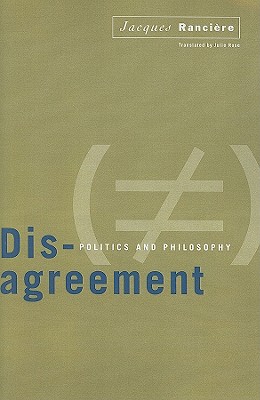Disagreement: Politics And Philosophy

Disagreement: Politics And Philosophy
"Is there any such thing as political philosophy?" So begins this provocative book by one of the foremost figures in Continental thought. Here, Jacques Rancière brings a new and highly useful set of terms to the vexed debate about political effectiveness and "the end of politics."
What precisely is at stake in the relationship between "philosophy" and the adjective "political"? In Disagreement, Rancière explores the apparent contradiction between these terms and reveals the uneasy meaning of their union in the phrase "political philosophy"--a juncture related to age-old attempts in philosophy to answer Plato's devaluing of politics as a "democratic egalitarian" process.
According to Rancière, the phrase also expresses the paradox of politics itself: the absence of a proper foundation. Politics, he argues, begins when the "demos" (the "excessive" or unrepresented part of society) seeks to disrupt the order of domination and distribution of goods "naturalized" by police and legal institutions. In addition, the notion of "equality" operates as a game of contestation that constantly substitutes litigation for political action and community. This game, Rancière maintains, operates by a primary logic of "misunderstanding." In turn, political philosophy has always tried to substitute the "politics of truth" for the politics of appearances.
Disagreement investigates the various transformations of this regime of "truth" and their effects on practical politics. Rancière then distinguishes what we mean by "democracy" from the practices of a consensual system in order to unravel the ramifications of the fashionable phrase "the end of politics." His conclusions will be of interest to readers concerned with political questions from the broadest to the most specific and local.
PRP: 215.91 Lei
Acesta este Prețul Recomandat de Producător. Prețul de vânzare al produsului este afișat mai jos.
172.73Lei
172.73Lei
215.91 LeiLivrare in 2-4 saptamani
Descrierea produsului
"Is there any such thing as political philosophy?" So begins this provocative book by one of the foremost figures in Continental thought. Here, Jacques Rancière brings a new and highly useful set of terms to the vexed debate about political effectiveness and "the end of politics."
What precisely is at stake in the relationship between "philosophy" and the adjective "political"? In Disagreement, Rancière explores the apparent contradiction between these terms and reveals the uneasy meaning of their union in the phrase "political philosophy"--a juncture related to age-old attempts in philosophy to answer Plato's devaluing of politics as a "democratic egalitarian" process.
According to Rancière, the phrase also expresses the paradox of politics itself: the absence of a proper foundation. Politics, he argues, begins when the "demos" (the "excessive" or unrepresented part of society) seeks to disrupt the order of domination and distribution of goods "naturalized" by police and legal institutions. In addition, the notion of "equality" operates as a game of contestation that constantly substitutes litigation for political action and community. This game, Rancière maintains, operates by a primary logic of "misunderstanding." In turn, political philosophy has always tried to substitute the "politics of truth" for the politics of appearances.
Disagreement investigates the various transformations of this regime of "truth" and their effects on practical politics. Rancière then distinguishes what we mean by "democracy" from the practices of a consensual system in order to unravel the ramifications of the fashionable phrase "the end of politics." His conclusions will be of interest to readers concerned with political questions from the broadest to the most specific and local.
Detaliile produsului









